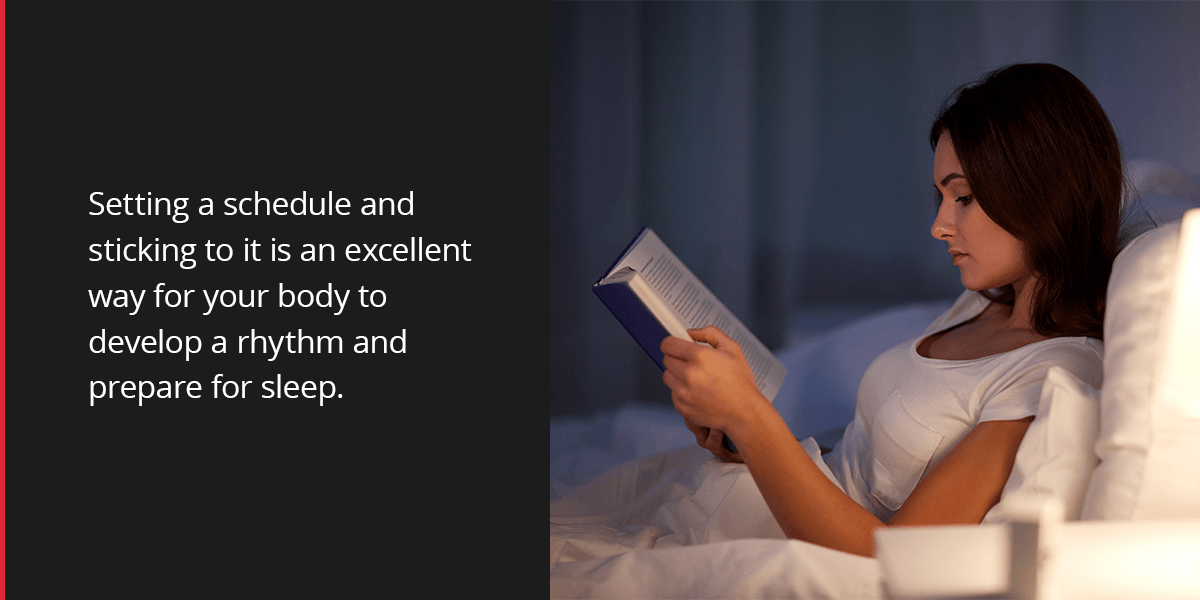Restless nights breed long, exhausting days. Groggy mornings and heavy eyes can make it challenging to get out of bed and start the day. Poor sleep can impact your ability to perform tasks, think clearly and make lasting connections.
Learning how to sleep well is about more than setting an earlier bedtime. You have to commit to your sleep hygiene and make sustainable changes that leave you feeling refreshed every morning and set you up for a good day. Developing healthy habits takes time, but it’s worth it for the immense benefits you’ll obtain. Keep reading to discover the importance of sleep and how you can improve your sleep hygiene.
Why Sleep Is Important
Sleep is essential to your physical and mental health throughout your life. How you feel in the morning can affect your entire day. Poor sleep can lead to low energy levels, irritation and other inhibiting factors, from cramps to headaches to heavy eyes.
As you sleep, your body supports your brain and maintains your health. The amount of sleep you get affects how you act, think, learn and work. Sleep supports the development and growth of children and teenagers, and a lack of sleep can make it much more challenging for them to focus in school. Adults need sleep to excel in their careers and form meaningful and lasting relationships.
A lack of quality sleep can contribute to various health problems that impact your quality of life. Good sleep hygiene will help your body obtain the rest it needs and prepare you for the day ahead.
What Is Sleep Hygiene?
Sleep hygiene refers to your habits, environment and behaviors regarding sleep. You can and should adjust each of these factors to ensure you’re getting restful sleep every night. Everything from your schedule to your bedroom to your nighttime routine can affect your sleep hygiene.
How do you know if you need to make adjustments? Look for signs of poor sleep health — trouble falling asleep, waking up frequently throughout the night or feeling tired throughout the day.
Tips for Better Sleep Hygiene
Small and large changes can significantly impact the quality of your sleep hygiene. Developing better sleep starts with habits that stretch from the moment you wake up in the morning to the time you go to bed.
Similar to caring for your physical hygiene, there are many different steps you can take to improve your sleep hygiene. You may need to try a few new habits to determine what works best for your body. Beyond getting the proper number of sleep hours, you can create a relaxing environment and fill your day with worthwhile activities to prepare for the night ahead.
Check out these strategies to develop healthy sleep habits:
1. Know How Much Sleep You Need
One of the first things you should consider is how much sleep you get every night compared to how much you need. The amount of sleep you need will differ as you age — it’s normal and healthy to go through changes. Here’s how much rest you should be getting every night:
- 14 to 17 hours for newborns
- 12 to 16 hours for infants 4-12 months old
- 11 to 14 hours for children 1-2 years old
- 10 to 13 hours for preschoolers 3-5 years old
- Nine to 12 eleven hours for children 6-12 years old
- Eight to 10 hours for teenagers
- Seven to nine hours for adults 18-64 years old
- Seven to eight hours for adults older than 65 years old
2. Create a Consistent Sleep Routine
When you’re looking for ways to improve your sleep hygiene, your nighttime routine is a good place to start. Everything you do before getting into bed can affect how you’ll sleep. Setting a schedule and sticking to it is an excellent way for your body to develop a rhythm and prepare for sleep. Here’s how you can create a consistent sleep routine:
- Get up and go to bed at the same time every day, including on weekends.
- Get to bed early enough to get the amount of sleep you need each night.
- Craft a relaxing nighttime routine to signal your body that it’s time for bed.
3. Create a Sleep-Friendly Environment
Your routine may only be as helpful as your environment. Noisy, bright or uncomfortable spaces will impede your sleep the moment you get into bed. Follow these tips to create a comfortable, sleep-friendly environment:
- Reduce noise and light as much as possible when trying to fall asleep.
- Use soothing scents like lavender to create a calmer space.
- Keep your room at a cool, comfortable temperature.
- Shut off your electronics at least half an hour before bed.
4. Cultivate Healthy Daytime Habits
You might be surprised that your daytime habits can affect your sleep, but everything you do throughout the day can shift your internal clock. Adjusting your habits can be a helpful next step if you’ve already created a sleep-friendly environment and have a consistent schedule. Evaluate these daytime habits:
- Refrain from drinking caffeine in the evening or afternoon.
- Finish your meals a few hours before bedtime and only have light snacks if you’re hungry later.
- Don’t drink alcohol close to bedtime.
- Reserve your bed for relaxing activities and study or work in another location.
- Get regular exercise during the day.
- Limit naps to the early afternoons and keep them short.
5. Work With Your Body
One of the best ways to get your body on track is to work with it rather than against it. Your body will signal when it needs something. Just like you get hungry when it’s time to refuel and feel thirsty when it’s time to hydrate, your body will let you know when you’re tired. Work with your body to achieve good sleep hygiene:
- Don’t force yourself to sleep — only go to bed when you’re tired.
- If you’re struggling to fall asleep after 20 minutes, get out of bed and perform a light, quiet activity with minimal light.
Consequences of Poor Sleep
Everyone has different sleep routines that work for their schedule, bodies and lifestyle. Regardless of your specific habits, getting quality sleep is essential for your health and everyday life. Sleep can impact your mental health and physical well-being and poor sleep can cause issues that impede your daily routines and overall life quality.
Many people suffer from short-term effects of sleep loss or poor sleep. Sleep disturbances can increase the risk of anxiety and depression as well as other long-term mental health issues, including increased stress and mood disorders. In addition to worsening these symptoms, prolonged disruptions can lead to cardiovascular disease, diabetes and reduced immune system function.
Can a Chiropractor Help With Sleep Problems?
Improving your sleep hygiene begins with you, but you don’t have to face it alone. Sleep issues can result from a variety of factors, including misalignments. You should consider seeing a chiropractor for sleep problems if you experience discomfort in your spine, legs, hips or neck when you go to bed.
By visiting a chiropractor, you can meet with a medical professional to adjust your skeletal and muscular systems. Chiropractic treatment can help you alleviate physical issues and address problems like migraines that impede your sleep quality.
Learn How to Improve Sleep Quality With Thrive Chiropractic Group
Thrive Chiropractic Group proudly serves South Oklahoma City, including Edmond, Moore and the surrounding areas. Our doctors deliver solutions for headaches, back pain, work injuries, neck pain, muscle tension and tightness and common conditions like asthma and allergies. We can also support your goal to achieve better general wellness.
Our mission is to help as many people take control of their health as possible. Our office has been serving our community for more than 14 years with complicated cases like pregnancy, accident victims, post-surgery recovery and osteoporosis.
Whether you’re looking to improve your body’s performance or need to alleviate pain to get better sleep, our doctors can help. Contact Thrive for an appointment and guide yourself to better sleep.



